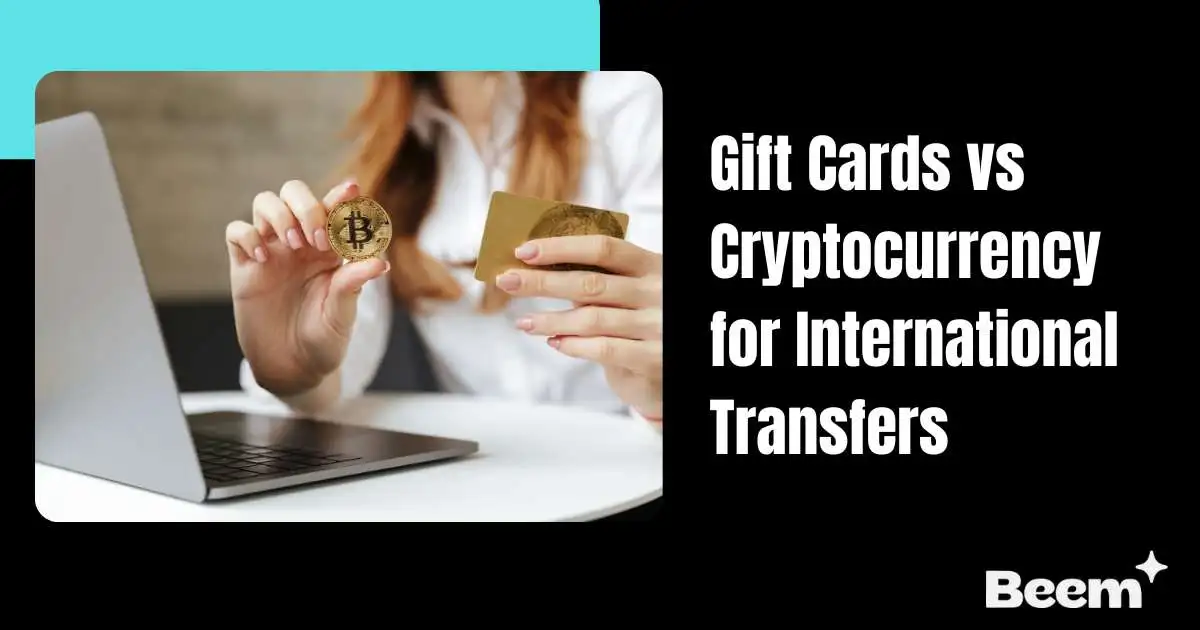As global connectivity increases, global money transfers are in greater demand. Gift Cards vs Cryptocurrency are among the popular options people consider. Transferring money internationally has been a complex and costly affair in the past, with numerous services providing different options of methods, speed, and prices.
Yet, with new technologies developed today, gift cards and cryptocurrency have become new alternatives that promise to make it easier. This article will seek to compare cryptocurrency with gift cards as a means of international money transfers and examine their advantages, disadvantages, and optimal use scenarios.
What Are Gift Cards and Cryptocurrency?
1. What Are Gift Cards?
- Gift cards are prepaid for purchases at specific retailers (e.g., Amazon, Walmart) or locations where Visa or MasterCard is accepted.
- These cards can be used globally, and they can either be physical or digital.
- International Transfers with Gift Cards: Gift cards can be convenient for sending money across borders. You can purchase a prepaid Visa/MasterCard gift card or retailer-specific card and send it to the recipient, who can then use it for shopping or online purchases.
2. What Is Cryptocurrency?
- Cryptocurrency is a digital currency that uses cryptography for security. It operates on decentralized networks like blockchain, making it resistant to censorship and government control.
- The most popular cryptocurrencies for international transfers include Bitcoin, Ethereum, and Litecoin.
- International Transfers with Cryptocurrency: Cryptocurrencies can be sent across borders instantly, providing a decentralized alternative to traditional money transfer services. However, both the sender and recipient need to have access to cryptocurrency wallets and exchanges.
Read related blogs: How to Use Gift Cards for Cross-Border Gift Giving
Comparing Gift Cards and Cryptocurrency for International Transfers
1. Ease of Use
1.1 Gift Cards
- Simple Process: Sending a gift card is straightforward: Buy the card, send it to the recipient, and they can redeem it.
- Global Acceptance: Gift cards, predominantly prepaid Visa/MasterCard cards, are accepted globally at millions of physical and online stores.
- No Technical Knowledge Required: The user doesn’t need to know anything about blockchain technology, wallets, or exchanges. The sender buys a card and sends it.
1.2 Cryptocurrency
- Requires Some Knowledge: Cryptocurrency transfers require understanding wallets, private keys, and blockchain technology. Setting up a wallet and handling keys can be intimidating for beginners.
- Global Accessibility: Cryptocurrency can be sent across borders, but both the sender and recipient must access a cryptocurrency exchange or wallet.
- Learning Curve: Sending crypto involves understanding blockchain transactions, which can be challenging for those unfamiliar with technology.
2. Speed of Transfers
2.1 Gift Cards
- Digital Gift Cards: Digital gift cards can be delivered instantly or within minutes, making them a fast solution for sending money across borders.
- Physical Gift Cards: If you send a physical gift card, the delivery time can range from several days to weeks, depending on the shipping method and destination country.
2.2 Cryptocurrency
- Speed: Cryptocurrencies like Bitcoin or Ethereum can offer near-instant transfers, with some transactions taking just a few minutes. However, network congestion at certain times can slow the transfer speed.
- 24/7 Availability: Cryptocurrency transactions can occur anytime, day or night, unlike traditional banking systems, which operate during business hours.
3. Fees and Costs
3.1 Gift Cards
- No Fees for Sender: In most cases, gift cards are purchased without extra transfer fees. However, when used internationally, there may be activation, maintenance, or conversion fees.
- Retailer-Specific Cards: Some retailer-specific cards may have restrictions or additional fees for foreign transactions.
3.2 Cryptocurrency
- Transaction Fees: Cryptocurrency transactions can come with varying fees, especially when the network is congested (e.g., during peak times, Bitcoin or Ethereum may have higher fees).
- Stablecoins and Newer Blockchains: Some newer blockchains or stablecoins like XLM or USDT offer much lower transaction fees, which can benefit smaller transfers.
4. Global Accessibility
4.1 Gift Cards
- Widely Accepted: Prepaid Visa/MasterCard gift cards are accepted in millions of locations worldwide. They can also be used for online shopping and in-store purchases.
- Retailer-Specific Cards: These may be limited to specific regions or platforms. For instance, an Amazon gift card can only be used on the Amazon platform, limiting flexibility.
4.2 Cryptocurrency
- Universal Accessibility: Cryptocurrencies are accessible globally, and anyone with a cryptocurrency wallet and internet access can receive or send funds.
- Regulatory Hurdles: In some countries, cryptocurrencies are restricted or face regulatory challenges. For example, countries like China have banned cryptocurrency trading, while others are introducing regulations.
5. Security and Privacy
5.1 Gift Cards
- Reasonably Secure: Gift cards, especially digital cards, are secure and often protected by PIN codes or other security features.
- Risk of Fraud: There’s a risk if the gift card details are shared improperly or with untrustworthy individuals. Scams often target people with fraudulent requests for gift cards.
5.2 Cryptocurrency
- Highly Secure: Cryptocurrency transactions are encrypted and rely on decentralized blockchain technology, making them highly secure.
- Private Keys: The most significant risk is losing access to your private key. If a user loses their private key, they lose access to their cryptocurrency permanently.
- Privacy: Cryptocurrency offers more privacy compared to traditional methods. Transactions don’t require personal information, but using secure wallets and exchanges is essential.
6. Risk and Volatility
6.1 Gift Cards
- Low Risk: The value of a gift card is fixed at the time of purchase, meaning the sender and recipient know exactly how much money will be received.
- No Market Fluctuations: Gift cards are not subject to market volatility, so their value remains stable.
6.2 Cryptocurrency
- High Risk: Cryptocurrency is highly volatile, meaning the value of assets like Bitcoin and Ethereum can fluctuate significantly within minutes.
- Potential for Gains or Losses: The value of the cryptocurrency at the time of sending may be different by the time the recipient redeems it, potentially leading to unexpected gains or losses.
Read related blogs: Unlock Instant Global Transfers by Sending Money via Gift Cards
Pros and Cons of Gift Cards for International Transfers
1. Pros
- Simple and Easy to Use: No technical knowledge required.
- Low or No Fees: Generally, no additional fees for the sender.
- Instant or Near-Instant Delivery: Especially with digital cards.
- Global Acceptance: Accepted in millions of locations worldwide.
2. Cons
- Limited Use: Some gift cards can only be used at specific retailers or platforms.
- International Fees: Some cards may have additional fees or limitations when used internationally.
- Shipping Delays for Physical Cards: Physical cards may take time to reach the recipient.
Pros and Cons of Cryptocurrency for International Transfers
Here’s a table comparing the pros and cons of gift cards for international transfers:
| Pros | Cons |
| Simple and Easy to Use: No technical knowledge required. | Limited Use: Some gift cards can only be used at specific retailers or platforms. |
| Low or No Fees: Generally, no additional fees for the sender. | International Fees: Some cards may have additional fees or limitations when used internationally. |
| Instant or Near-Instant Delivery: Especially with digital cards. | Shipping Delays for Physical Cards: Physical cards may take time to reach the recipient. |
| Global Acceptance: Accepted in millions of locations worldwide. |
Which Is Better for International Transfers: Gift Cards or Cryptocurrency?
1. When to Use Gift Cards
- Quick, Low-Fee Transfers: These are ideal for sending fixed amounts to recipients who need to shop at a specific retailer or use a general-use prepaid card.
- New to Digital Transfers: Perfect for those who prefer a simple, user-friendly transfer method with minimal technical knowledge.
2. When to Use Cryptocurrency
- Tech-Savvy Users: Best for those familiar with cryptocurrency who want a flexible, decentralized method for sending money internationally.
- 24/7 Transfers with Low Fees: Ideal for people who need to send money across borders with low fees, especially for larger transactions or those with volatile market conditions.
Conclusion
Both gift cards and cryptocurrency offer distinct advantages and drawbacks for international transfers. Gift cards provide a simple, secure, and cost-effective way to send money, especially for smaller transfers or specific retail purchases.
On the other hand, cryptocurrency offers a flexible, decentralized method for those familiar with the technology and willing to navigate its volatility and risks. Beem makes digital money transfers easy with gift cards. Its “Send Now, Pay Later™” feature offers a secure, flexible, and budget-friendly way to support your loved ones worldwide.
The choice between gift cards and cryptocurrency ultimately depends on the sender’s and recipient’s preferences, technical comfort level, and specific transfer needs.
FAQs: Gift Cards vs Cryptocurrency for International Transfers
Are gift cards safer than cryptocurrency for transfers?
Gift cards are relatively secure, but cryptocurrency offers higher security with encryption. However, cryptocurrency transactions require safeguarding private keys to avoid losing access to funds.
Can I send large amounts of money with gift cards or cryptocurrency?
Both methods can be used for large transfers, but cryptocurrency offers more flexibility for larger sums, depending on network fees and wallet limits.
How do cryptocurrency transaction fees compare to gift card fees?
Gift cards typically have no fees, but cryptocurrency can incur higher fees depending on network congestion.
Can gift cards be used in countries where cryptocurrency is restricted?
Yes, gift cards can be used globally, even in countries with cryptocurrency restrictions.
What happens if a gift card is lost or stolen during an international transfer?
Report it to the provider immediately to see if the card can be deactivated or replaced.






